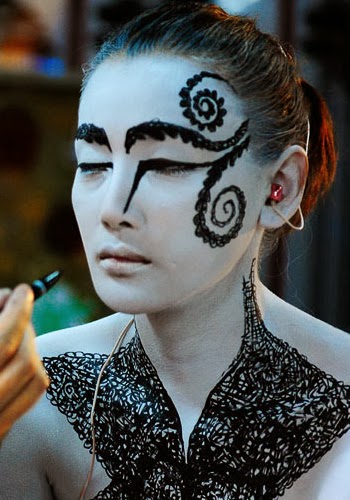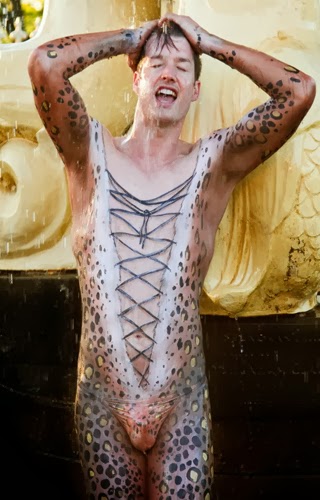For centuries, face painting has been used around the world for religious reasons, cultural reasons, hunting, and military. It was used in different Native American tribes during rituals and they would use different colors they believed had special meaning. It has been used in Japan by geishas for over a hundred years. The original paint that geishas used to paint their faces white was lead-based. Once it was discovered that lead paint was harmful towards the skin, it was replaced with powder. Face painting has also been used as camouflage amongst hunters and military. They originally used whatever natural substances, such as mud, to blend into their environment. Now it is still common practice amongst hunters and the military to use it as a way to stay hidden during a hunt or in battle. Theatres have used face painting throughout history as well.
Halloween Face Painting
Many groups would get together paint their faces elaborately before performances. Opera houses were known for using to add to their costumes. It became popular in the 1960s during the hippie movement. Women would paint flowers and peace signs on their cheeks during protests. It wasn't until the 1980s that such form of body art became a fun activity for kids. It has now become quite common at county fairs, large outdoor markets, theme parks, festivals, and other gatherings that attract children. In today's culture it has been geared mainly towards children, but many teenagers and adults enjoy it for special events.
Face painting for children at events is done usually on the cheek or done to look like a mask. The artists can also do half face or full face painting as well. When doing full design on the face, the designs can take between 5-10 minutes depending on how intricate they are, while smaller standard designs will take 3-5 minutes on average. A simple design can be painted on a small child in less than a minute. Anyone can be a painter of face, all it takes is a little practice!
Face painting for children at events is done usually on the cheek or done to look like a mask. The artists can also do half face or full face painting as well. When doing full design on the face, the designs can take between 5-10 minutes depending on how intricate they are, while smaller standard designs will take 3-5 minutes on average. A simple design can be painted on a small child in less than a minute. Anyone can be a painter of face, all it takes is a little practice!
Most that are sold at toy and craft stores look like large crayons. They are usually grease based and drag on the skin. For easier use and safety reasons, it's best to use good quality, professional water based paints. They can be found at theater, dance, and other performing arts stores. They're made to meet cosmetic guidelines for skin use and are often referred to as make up. Even with the professional quality paint, do not apply it to bruised or cut skin because of the risk of further damage. Common designs for face painting for children are animals and cartoon character images. There are more creative and dramatic designs that are popular with all ages, especially for teens and young adults. This form of body art can also be used for any age for sporting events, which is very common, especially amongst the male fans.
After a face painting party when you want to remove it, use a dark cloth and a gentle cleanser. Using baby or kids' shampoos work well to remove face paint because they are mostly "tear-free". You'll want to lather, wipe, rinse, and repeat. The designs will come off the skin with very little rubbing and gentle rinsing, so don't scrub. Especially when washing it off of a child's face, scrubbing can irritate their skin. Traces of face paint may occasionally remain after washing off the main part, but they can be easily removed by applying a moisturizing lotion and waiting for at least 30 minutes, and then just washing again.



















































